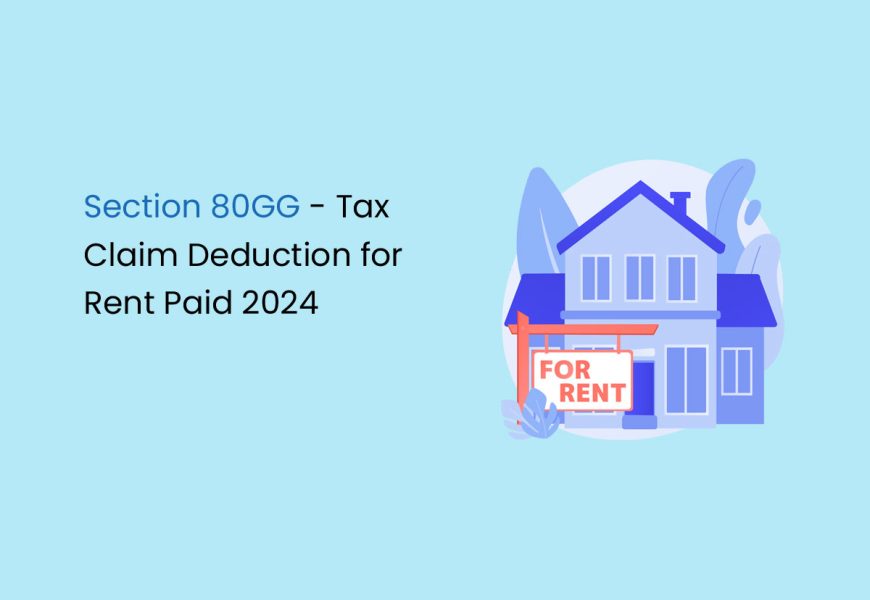Section 80GG is more than just a tax provision, it’s a potential game-changer for your finances. If you find yourself navigating the intricacies of accommodation rent payments and wondering how to make the most of it in your tax filing, you’re in the right place. This section holds the key to deductions that could significantly ease your tax burden!
In this article, we’ll unravel the mysteries of Section 80GG, break down its implications, and empower you with the knowledge to navigate your way through tax season seamlessly.
What is Section 80GG?
Section 80GG is a provision within the framework of the Income Tax Act that provides taxpayers with the opportunity to claim deductions for accommodation rent payments. This deduction is accessible to salaried and self-employed individuals, extending to those with no income. By leveraging this provision, individuals can effectively mitigate their overall tax liability, demonstrating the Act’s commitment to equitable tax treatment.
Who Qualifies for a Section 80GG Tax Deduction?
Individuals who pay rent for their accommodation but do not receive any House Rent Allowance (HRA) from their employer are eligible to claim a deduction under Section 80GG. However, certain conditions must be met:
- The individual should not possess any residential property at their place of employment or business.
- The individual, their spouse, or minor child should not own any residential property elsewhere.
- The individual must refrain from claiming HRA deductions under other sections of the Income Tax Act.
80GG Deduction Limits
The eligible amount for deduction under Section 80GG is determined based on the following criteria. The deduction is granted based on the lowest value among these three criteria:
- Rs.5,000 per month or Rs.60,000 per year
- 25% of the total income (excluding specific categories like long-term capital gains, short-term capital gains under Section 111A, and income under Section 115A or 115D, along with deductions under Sections 80C to 80U. This calculation considers income before making a deduction under Section 80GG).
- Actual rent paid less than 10% of income
What Constitutes the Deductible Amount Under Section 80GG?
The deduction under Section 80GG is contingent upon specific conditions:
- The maximum deduction allowable is Rs. 2,000 per month or 25% of the total income, whichever is lower.
- The rent paid must exceed 10% of the total income.
The term “total income” encompasses earnings from all sources, encompassing salary, business, and other avenues.
Benefits of Section 80GG
Section 80GG offers a key advantage by granting a tax deduction to individuals who incur rental expenses for their accommodation despite not receiving a House Rent Allowance (HRA). This proves particularly advantageous for individuals with lower incomes or those in the early stages of their careers. Furthermore, it serves as a valuable means to diminish tax liability and enhance overall savings.
This deduction is inclusive and available to both salaried and self-employed individuals, extending its benefits even to those without an active income.
Limitations of Section 80GG
While Section 80GG provides a valuable tax deduction, it comes with certain limitations:
- Deduction Cap: The maximum deduction allowable is capped at Rs. 2,000 per month or 25% of the total income, whichever is lower. This limitation may render the tax benefit relatively modest, particularly for individuals with higher incomes or substantial rent payments.
- Rent-to-Income Ratio: To qualify for the deduction, the rent paid must exceed 10% of the total income. This requirement may exclude individuals paying lower rents or those with higher incomes from availing of the tax benefit.
- No Concurrent Benefits: Individuals claiming a deduction under Section 80GG cannot simultaneously benefit from tax rebates under other sections for the same rent paid. This restricts the potential cumulative tax benefits available to the taxpayer.
Section 80GG’s Tax Deductions for Property Owners
To avail of Section 80GG deductions, property owners need to meet specific criteria:
- Residency Requirement: Owners must pay rent for their current residence.
- Workplace Location: Owned properties should not be in the same city or location as their workplace. If they own property in the city but choose to rent, Section 80GG doesn’t apply.
- Strategic Ownership: Owning property in a different city while claiming rent benefits in the working city is permissible. In this scenario, the owned property is treated as let out.
Procedure for Claiming Deduction Under Section 80GG
The procedure is straightforward, you need to follow these simple steps:
- Include Form 10BA while filing the income tax return.
- Provide details like house rent amount, complete addresses of the landlord and assessee, rental period specifics, and proof of rent paid.
- Include basic information about the assessee and landlord, such as names and contact details.
- Keep supporting documents like the rental agreement and government-issued ID cards readily available.
- Confirm that the employer does not reimburse the rent paid, as only self-funded rent qualifies for the deduction.
How to Fill Form 10BA?
Completing Form 10BA is essential for individuals seeking to claim a deduction under section 80GG for rent paid on a rental property. This declaration ensures that the claimant is not availing the benefit of a self-occupied property elsewhere, either in a different location or at the same employment location.
- Provide your Name and PAN for identification.
- Furnish the complete address of the assessee for correspondence.
- Specify the tenure and precise amount of rent paid.
- Indicate the preferred mode of rent payment for clarity.
- Include the name and address of the landlord with accuracy.
- Provide the PAN of the landlord if the rental amount exceeds INR 1 lakh.
How to get Form 10BA?
Acquiring Form 10BA is a straightforward process. Individuals can obtain the form from their organisation’s HR department or visit tax offices for a physical copy. Alternatively, the form is readily available for download on the official Income Tax website, providing easy accessibility for individuals to proceed with their tax-related declarations.
Frequently Asked Questions about Section 80GG
Who is eligible for deduction under Section 80GG?
Salaried individuals without HRA benefits can claim a deduction under Section 80GG.
What is Form 10BA in relation to Section 80GG?
Form 10BA is a declaration required for individuals claiming a deduction under section 80GG for rent paid on rental property.
Can I claim Section 80GG if I live with my parents and pay them rent?
Yes, you can claim Section 80GG while living with your parents if you have a rental agreement with them, and they declare the rental payment as part of their income.
Can I claim Section 80GG if I own a house in a different city but live in a rented residence?
Yes, you can claim Section 80GG for the rent paid, provided you do not own a house in your city.
Can I claim Section 80GG benefits if the property is in my father's name?
Yes, you can claim Section 80GG benefits when the property is in your father's name, and you pay rent to him, subject to having a rental agreement and submitting Form 10BA.














